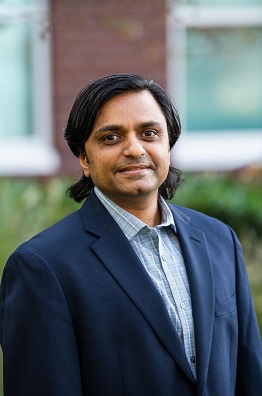Graph Analytics in the Accelerator-enabled Exascale Era

Combinatorial algorithms in general, and graph algorithms in particular, play a critical enabling role in numerous scientific applications. The irregular memory access nature of these algorithms makes them one of the hardest algorithmic kernels to implement on parallel systems. To address the challenges, ExaGraph, the co-design center on combinatorial algorithms, was established to design and develop methods and techniques for efficient implementation of key combinatorial (graph) algorithms chosen from a set of exascale applications, targeting accelerator-enabled pre-exascale and exascale systems.
Dr. Halappanavar, a chief computer scientist at PNNL, will present a brief overview of the latest work on multi-GPU systems for two prototypical graph problems — graph clustering and influence maximization — and demonstrate substantial gains in performance. He serves as the group leader of the Data Science and Machine Intelligence group. His research has spanned multiple technical foci and includes combinatorial scientific computing, parallel graph algorithms, artificial intelligence and machine learning, and the application of graph theory and game theory to solve problems in application domains, such as scientific computing, power grids, cybersecurity, and life sciences.
Contact Chris Gunning, cgunning@ieee.org, Boise Computer Society chapter chair, if you have a section, chapter, or student branch that would like to be a co-host for this event.
Date and Time
Location
Hosts
Registration
-
 Add Event to Calendar
Add Event to Calendar
Loading virtual attendance info...
- Contact Event Hosts
-
Boise Computer Society Chapter chair, Chris Gunning, cgunning@ieee.org
IEEE Computing Chair Spokane, Steve Simmons, ssimmons@ewu.edu
Pikes Peak Computer Society Chapter chair, Gene Freeman, genef@ieee.org
Speakers
Dr. Mahantesh Halappanavar of Pacific Northwest National Laboratory (PNNL)
Graph Analytics in the Accelerator-enabled Exascale Era
Combinatorial algorithms in general, and graph algorithms in particular, play a critical enabling role in numerous scientific applications. The irregular memory access nature of these algorithms makes them one of the hardest algorithmic kernels to implement on parallel systems. To address the challenges, ExaGraph, the co-design center on combinatorial algorithms, was established to design and develop methods and techniques for efficient implementation of key combinatorial (graph) algorithms chosen from a set of exascale applications, targeting accelerator-enabled pre-exascale and exascale systems. I will present a brief overview of the latest work on multi-GPU systems for two prototypical graph problems — graph clustering and influence maximization — and demonstrate substantial gains in performance. We believe that several applications will benefit from the algorithmic and software tools developed by the ExaGraph team.
Biography:
Dr. Halappanavar is a chief computer scientist at PNNL, where he serves as the group leader of the Data Science and Machine Intelligence group. He also holds a joint appointment as adjunct faculty in computer science at the School of Electrical Engineering and Computer Science at Washington State University in Pullman. His research has spanned multiple technical foci and includes combinatorial scientific computing, parallel graph algorithms, artificial intelligence and machine learning, and the application of graph theory and game theory to solve problems in application domains, such as scientific computing, power grids, cybersecurity, and life sciences. He co-authored a book on design of parallel graph algorithms on shared-memory architectures and has authored over 90 technical publications for peer-reviewed journals, conferences, and workshops. He is a member of the Society for Industrial and Applied Mathematics (SIAM), and a senior member of the Association for Computing Machinery (ACM) and the Institute of Electrical and Electronics Engineers (IEEE).
Email:

